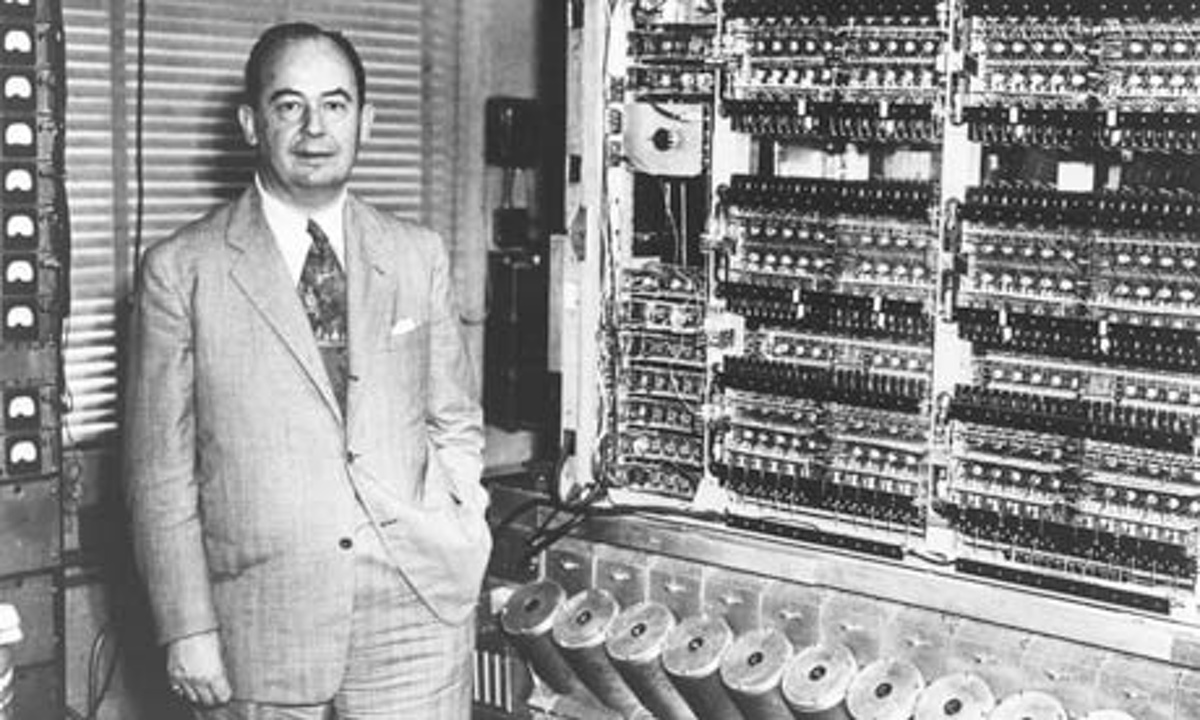Dr. John von Neumann
The Father of the Modern Computer

John von Neumann (December 28, 1903 - February 8, 1957) was a Hungarian-American mathematician, physicist, inventor, computer scientist, and polymath. He made major contributions to a number of fields, including mathematics (foundations of mathematics, functional analysis, ergodic theory, geometry, topology, and numerical analysis), physics (quantum mechanics, hydrodynamics, and quantum statistical mechanics), economics (game theory), computing (Von Neumann architecture, linear programming, self-replicating machines, stochastic computing), and statistics.
He was a pioneer of the application of operator theory to quantum mechanics, in the development of functional analysis, and a key figure in the development of game theory and the concepts of cellular automata, the universal constructor and the digital computer. He published over 150 papers in his life: about 60 in pure mathematics, 20 in physics, and 60 in applied mathematics, the remainder being on special mathematical subjects or non-mathematical ones. His last work, an unfinished manuscript written while in the hospital, was later published in book form as The Computer and the Brain.
Major Works
- Von Neumann was the founder of many theories such as the Ergodic Theory, the Operator Theory, the Lattice Theory, Game Theory and the Measure Theory as well as a branch of geometry known as continuous geometry and the Von Neumann Algebras.
- ‘Theory of Games and Economic Behavior’, which Neumann had co-authored with economist Oskar Morgenstern, is however his most significant work. The book, published in 1944, created the interdisciplinary research field of game theory. The work was based on Neumann’s 1928 research work, ‘On the Theory of Parlor Games’.
Awards & Achievements
- John von Neumann had received several awards; among them Bôcher Memorial Prize (1938), Navy Distinguished Civilian Service Award (1946), Medal for Merit (1946), Medal of Freedom (1956) and Enrico Fermi Award (1956) are the most significant.
Personal Life & Legacy
- On January 1, 1930, von Neumann married Mariette Kövesi, who had studied economics at Budapest University. Soon after that, they shifted to the U.S.A, where their only child, Marina von Neumann Whitman, was born. The couple divorced in 1937.
- Marina later grew up to be noted economist. She is now a Professor of Business Administration and Public Policy at the University of Michigan's Ross School of Business as well as The Gerald R. Ford School of Public Policy.
- In October 1938, von Neumann married Klara Dan, a scientist, and a pioneering computer programmer. The couple did not have any children. They remained married until his death in 1957.
- In 1955, von Neumann was diagnosed with cancer and his health deteriorated very quickly. In spite of that, he continued to work and in 1956, in an essay written for James Newman’s ‘The World of Mathematics’, he defended applied mathematics.
- During his last days, fearing that he might reveal military secrets under medication, he was provided with military security. He died on February 8, 1957 at the Walter Reed Army Medical Center in Washington DC.
- Apart from numerous mathematical formulas named after von Neumann, his legacy is being carried forward by a number of awards and lectures instituted in his honor.
- A lunar impact crater that lies on the far side of the Moon, in the northern hemisphere, has also been named Von Neumann after him.
- In 2005, he was depicted on 37-cent self adhesive US postage stamp, issued by United States Postal Service.
"If people do not believe that mathematics is simple, it is only because they do not realize how complicated life is."